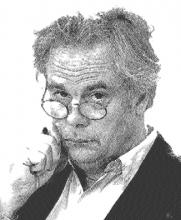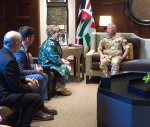You are here
Carter — a life up and down
Aug 20,2015 - Last updated at Aug 20,2015
“The lives of all politicians end in failure.”
So said Enoch Powell, a maverick former Cabinet minister in the British government.
Of recent US presidents, Jimmy Carter has not been alone in failing. Think of George W. Bush (Iraq war). Bill Clinton (Monica Lewinsky and a wasted last term). George H.W. Bush (messing up the economy and laying the foundation, along with Clinton, for the great economic crash of 2007) Ronald Reagan (missing the chance with Soviet president Mikhail Gorbachev to create the nuclear-free world that he offered), Jimmy Carter (driving out the Soviet army and thus initiating the war in Afghanistan, laying the groundwork for both Al Qaeda and Daesh), Richard Nixon (firing up the Vietnam war that forced him to resign in disgrace).
And now Barack Obama. Despite some important achievements, he has allowed his flawed policy on Ukraine to lead to a dangerous confrontation with Russia.
Back to Carter who, according to himself, appears to be dying.
I had a tangential responsibility for his election. I went to interview him in Atlanta when he was governor of Georgia.
He took me into his bedroom to see his small library of books. He plucked down a copy of a sort of autobiography cum manifesto he had written.
“I’m a bit short of copies,” he said.
“Can you mail it back once you have read it?”
I did. I was foolish not to have asked him to autograph it since shortly after, unexpectedly, he won the fight to become president.
I also put my foot in it. I was a good friend of Andrew Young, who was Martin Luther King’s chief of staff. We got to know each other when I worked on King’s staff and his “End the Slums” campaign in Chicago.
Young was also from Atlanta. He was then a congressman and later Carter appointed him ambassador to the UN.
I told Carter about our friendship. Carter asked: “What does he think of me?”
I replied: “Not much”.
At a reception shortly after, Carter accosted Young about this remark which led to Young explaining why he felt like that. They had a number of meetings after that cleared the air. Young was an important player in national politics.
Soon after Carter announced he was going to run for president. Young agreed to join his team.
According to Carter, Young won the election for him by getting out the black southern vote.
Shortly after Carter won I visited Young and he said, laughing: “Look what you have done with your big mouth: elected the president of the United States.”
Carter gave Young carte blanche to run America’s African policy, not least the effort to end white rule in Rhodesia and South Africa. Carter was persuaded by Young to ask Congress to introduce tight economic sanctions against South Africa.
Young, thanks to his UN post, which effectively made him No. 2 in the State Department, backed up Carter on his nuclear disarmament efforts with the Soviet Union and the return of the Panama Canal to Panama (a big issue at the time).
He also was involved in Carter’s Middle East policy that led to the landmark peace treaty between Egypt and Israel.
He also supported Carter when he decided not to intervene in Iran to support the shah. The shah fell and the rigorously religious ayatollahs took over.
Not least, Carter, Zbigniew Brzezinski, Carter’s national security adviser and Young forged a more aggressive policy on human rights that vibrated all over the world.
Sadly, Young came to a bad end when it was discovered he had had unauthorised private conversations with Israeli and Palestinian diplomats. This was considered by Carter to have been a dangerous move.
Carter left office, not in disgrace, as few people have connected the dots until recently.
In a policy forged by Brzezinski, who I interviewed at length many times, the US shipped modern weapons, including the deadly Stinger missiles, to support the successful effort by the Afghans to drive the army of the Soviet Union out of Afghanistan.
If that was a victory, what followed was not. It led to civil war, with the best-armed faction, the Taliban, winning out. Later they gave a home and base to Al Qaeda which added Saudi Arabian arms and money to build up its strength. From here Al Qaeda prepared for September 11.
The US under George W. Bush decided to bomb Afghanistan in an attempt to squash Al Qaeda. The war has still not ended. Al Qaeda morphed into Daesh and here we are today living out Carter’s legacy.













